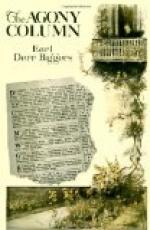The colonel got up and walked to the window; then turned and continued: “Captain Fraser-Freer and Von der Herts were completely unknown to each other. The mails were barred as a means of communication; but Fraser-Freer knew that in some way word from the master would reach him, and he had had a tip to watch the personal column of the Daily Mail. Now we have the explanation of those four odd messages. From that column the man from Rangoon learned that he was to wear a white aster in his button-hole, a scarab pin in his tie, a Homburg hat on his head, and meet Von der Herts at Ye Old Gambrinus Restaurant in Regent Street, last Thursday night at ten o’clock. As we know, he made all arrangements to comply with those directions. He made other arrangements as well. Since it was out of the question for him to come to Scotland Yard, by skillful maneuvering he managed to interview an inspector of police at the Hotel Cecil. It was agreed that on Thursday night Von der Herts would be placed under arrest the moment he made himself known to the captain.”
Hughes paused. Bray still idled with his pile of letters, while the colonel regarded him gravely.
“Poor Fraser-Freer!” Hughes went on. “Unfortunately for him, Von der Herts knew almost as soon as did the inspector that a plan was afoot to trap him. There was but one course open to him: He located the captain’s lodgings, went there at seven that night, and killed a loyal and brave Englishman where he stood.”
A tense silence filled the room. I sat on the edge of my chair, wondering just where all this unwinding of the tangle was leading us.
“I had little, indeed, to work on,” went on Hughes. “But I had this advantage: the spy thought the police, and the police alone, were seeking the murderer. He was at no pains to throw me off his track, because he did not suspect that I was on it. For weeks my men had been watching the countess. I had them continue to do so. I figured that sooner or later Von der Herts would get in touch with her. I was right. And when at last I saw with my own eyes the man who must, beyond all question, be Von der Herts, I was astounded, my dear Inspector, I was overwhelmed.”
“Yes?” said Bray.
“I set to work then in earnest to connect him with that night in Adelphi Terrace. All the finger marks in the captain’s study were for some reason destroyed, but I found others outside, in the dust on that seldom-used gate which leads from the garden. Without his knowing, I secured from the man I suspected the imprint of his right thumb. A comparison was startling. Next I went down into Fleet Street and luckily managed to get hold of the typewritten copy sent to the Mail bearing those four messages. I noticed that in these the letter a was out of alignment. I maneuvered to get a letter written on a typewriter belonging to my man. The a was out of alignment. Then Archibald Enwright, a renegade and waster well known to us as serving other countries, came to England. My man and he met—at Ye Old Gambrinus, in Regent Street. And finally, on a visit to the lodgings of this man who, I was now certain, was Von der Herts, under the mattress of his bed I found this knife.”




